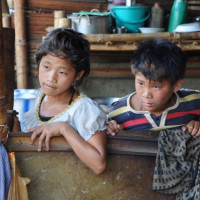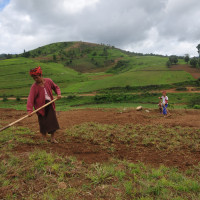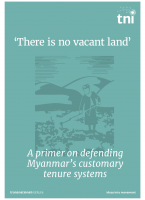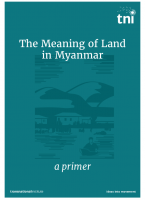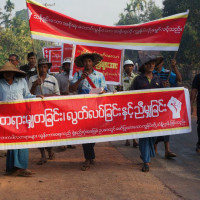No Camp Closure Without Restitution A Myanmar Commentary by the Kachin and Northern Shan IDP Land Protection Committee
Regiones
Fecha de publicación:
Internally Displaced Peoples (IDPs) in Myanmar today are caught in a ‘perfect storm’, which is the combination of the 2018 VFV Land Management Law, the BRI, and the National IDP Camp Closure Strategy.
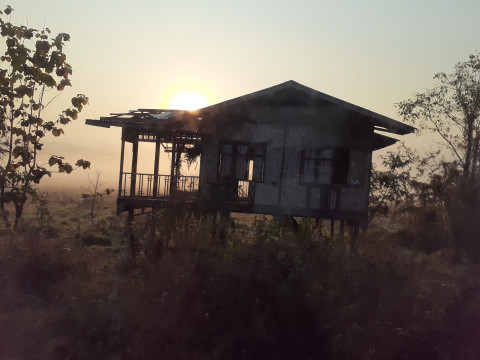
Bum Hkrang
In this commentary, it is argued that Internally Displaced Peoples (IDPs) in Myanmar today are caught in a ‘perfect storm’, which is the combination of the 2018 VFV Land Management Law, the BRI, and the National IDP Camp Closure Strategy. The current government’s plan for camp closure without restitution legitimizes and reinforces the VFV law and ratifies many land grabs that have already taken place, many of which are being consolidated under the Belt and Road Initiative (BRI). IDP land return without restituting the previous socio-economic and agroecological social order is surest way to prevent IDPs from reclaiming their land. Without an immediate social justice-oriented restitution, IDPs land, labour, lives and livelihoods risk being subsumed by the marginalizing currents of the BRI.
To understand what the one-year anniversary of the March 11 Vacant Fallow and Virgin (VFV) Land Management Law land registration deadline means to us, we must look back at past decades of land grabbing in our areas.
In the 1980s-1990s the big business of jade mining, mineral mining, teak logging, and livestock breeding started eating our land and resources. This was followed by the coming of the Shwe Li hydropower project in 1997, which took land for the project itself, and also more land all around Shwe Li too. Next came big infrastructure and more extraction projects using big machines that wrecked existing village infrastructures that we had built on our own. Many of our village roads became unusable due to damaging activities imposed from above.
The people negatively affected by these activities could not say anything at the time about what they were experiencing or how they were being affected. The outsiders would come and discuss with the villagers and at the beginning give a reason for the new infrastructure project. At first the villagers might be happy, but then later on noticed that the forests started to disappear, until eventually, all the forests were gone.
Next, in the 2000s, came the big agribusiness land concessions for various kinds of plantation agriculture (rubber, banana, sugarcane), as well as more big infrastructure projects like the railway. The government, armed groups, immigration officials, local authorities, local militias all cooperated with especially Chinese investors to grab our lands for agriculture projects. This also led to eventual Chinese domination of business activities in many of our areas. We lost control of more of our lands. And as agriculture plantations expanded, the businessmen also introduced foreign seeds and step by step villagers in agribusiness-affected areas stopped using the local seeds.
Then war came and we suddenly became IDPs. The war dragged on. By 2016 we began to hear mention of ‘BRI’ but without hearing any concrete information about, for instance, what kind of projects and for what exactly. “In one consult I heard they came in and said a project going on was approved and they will do it, so they are just letting the community know. Not really a consultation, but just letting us know.”
Behind the big official projects, even though they may be stalled, canceled or continued later, many little projects and extractions always followed, all of them having deep impacts on the villages we had been forced to leave behind. To the point that now there are many different armed groups and different companies present in our areas; they can carry arms and do official business in our area. They are what we call capitalists cooperating with local brokers to grab IDP lands and make profits.
And now today we IDPs are caught in a ‘perfect storm’, which is the combination of the 2018 VFV Land Management Law, the BRI, and the National IDP Camp Closure Strategy.
The current government laws, policies, programs and projects are in effect legalizing resource grabbing activities that have gone on before and up until now to dispossess us of our lands, forests, waters and social life and heritage. There is no recognition of customary rights, there is no law giving protection for our local systems. There are only laws that legalize all that has been taken from us while our lives have been frozen in IDP camps.
When the first VFV Land Law came out in 2012 we didn’t know about it at the time because the civil war was happening around us. It was only later that we began to fathom the terrible meaning of the sequence of events that had been set in motion. In 2011 we suddenly had to flee our villages when war broke out and we became IPDs. Then came in 2012 the adoption of the VFV Land Law which paved a ‘legal’ way for land that was left idle and unused for several years to be seized by the government and reallocated to others, regardless of circumstances like war.
There was also in 2012 the Farmland Law, which brought the possibility of applying for Form 7, you may say. But in our view Form 7 is still just a use right that can be taken away at any time. And, from our own research we know that even when some villagers (who may have the required documents and money in hand) have tried to apply, they do not ever succeed in getting that Form 7.
There seems to be a growing push for the lands of IDPs to be reallocated to others. Why? It seems that in the eyes of the Myanmar elite, and in the light of BRI agenda, ‘economic development’ means that our lands are needed, but we are not. Yet maybe for reasons of appearances, the way now to achieve this is through application of ‘rule of law’, specifically the VFV Land Law.
First, we lost our lands, our forests, our rivers and streams, and we became IDPs. Then in our suffering this dispossession, some other people have actually benefitted. Indeed, a few Myanmar people have benefitted from our losses, they are benefitting with the support of the government using laws like the VFV Land Law.
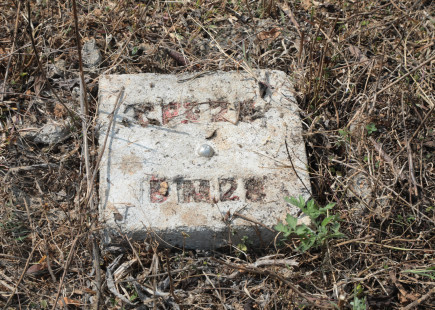
Because of VFV Land Law many chaotic things are happening in our lives. Apart from our losses of land, housing and property, there is increasing division among people too, with some focusing on getting the Form 7 because they hope it might be a pathway to owning the land. But we IDPs have already left our lands. How will we be able to go to the government office to apply for Form 7? Most of us have no National Registration Card (NRC), no other documentation, even though we own the land. Some of us have tried and failed. With the VFV Land Law anyone in theory can apply, but actually we IDPs in reality cannot apply.
What is clear to us from all this is that the Government wants to give our land to people with money whose definition of development is very different from ours.
Recently, we IDPs from different areas in Kachin and Northern Shan State took a moment to reflect and share are memories of what we would be doing at this same time of year if we were still in our villages. Here is what we learned:
“At this time, we would be harvesting vegetables: this is the happiest time, a very busy time.”
“In the last 8-9 years I remember a lot about my life. We practiced shifting cultivation. We did orange farming, we had cows. At this time, we would have already harvested, collected the oranges. We would have a lot of money now and would be going on holidays with our families. We would be letting the cows and buffalos out into the grazing areas, so they would be happy on the grazing land. But now our dreams are all gone. We are not rich anymore, we don’t anymore what are farmlands are like now, maybe bushland or in someone else’s hands.”
“This is the post-harvest time when we would be thinking and planning for the next year; it is the time of year for socializing. I remember this time a lot.”
“I remember a lot about my villages: clearing our land, harvesting; I remember a lot, but I can’t really express what I really feel.”
“In the past our land was really green and forested; we collected various forest products, we had a community forest. I always remember them and I think what are these forests looking like now, how big are they, who is protecting them and what is their situation now. I worry a lot and I also remember about our farm.”
“In the daytime the men would gather and hunt in the forest together. If it was very hot we would go to the stream and fish. We would bring our own local spirits and have a bonfire at night. It was a happy time.”
“I remember we would have so many fruits, harvesting grapes and corn. This would be harvest time right now, and it would also be the best time to go fishing in the village river.”
“Our whole village and church together we would be doing village development activities. We would be building bridges and roads to have access to cultivation areas in the coming rainy season. I would be harvesting mustard. Our children would be having a break from school, so when they came we would eat fresh vegetables and sit beside the stream with our mosquito nets; we would fish and prepare spicy Kachin food, we had many chilies and chili powders. Even though we had worries, we would all be forgetting these at those moments; at those times we would all be feeling safe.”
“Before we became IDPs we did agriculture. The men would be doing the harvesting now. We grew our own food crops and didn’t have to buy a lot; we were self-sufficient and healthy because of this. Unlike right now we are living in crowded areas and our health is deteriorating. We are living now closer to a hospital, but we are less healthy.”
“I remember doing shifting cultivation, doing together village activities. We would exchange our labor for shifting cultivation, we would go fishing together, we would hunt together, this would be the best time.”
“We worked hard on our farms. But the government has made our farms into a forest reserve area. We are very unhappy about this government initiative.”
“At this time, students would have finished final school exams and we would have finished harvesting already, so all will be happy because we live in a rural village; we could work and we could eat and then we could think together how to work for next growing cycle.”
What all these memories show is what has been destroyed by the war and years of forced absence from our villages. Forced absence has destroyed the socioeconomic and agroecological infrastructure of our productive villages. Even after just a couple of years of non-tillage, our farms could appear as if it is an idle, forested area – and thus readily fitting the VFV Land Law definition of vacant land. Land clearing and farm maintenance requires a lot of regular labour input. For us, restitution does not mean simply returning to our land – but restoring it to the previous social and ecological order prior to our forced absence.
Since we have been gone, our homes, our, roads and bridges, our farms and our forests, our pastures and waters have been destroyed. Our food self-sufficiency has been destroyed. Our ability to live a healthy life and raise healthy children based on our own resources and choices has been destroyed. And our village social life, our village order and system of living and working and planning together as a social community has been destroyed.
Yet despite all this destruction, we hold onto our belief in the idea of restorative justice, and with other IDPs in Myanmar facing a similar situation, we continue to work toward the realization of our human right to restitution, as spelled out in the Pinheiro Principles, the Deng Principles, the UN-CFS Tenure Guidelines, International Refugee Law, and the Universal Declaration of Human Rights (see also earlier position paper by Myanmar IDPs).
But now there is a third storm brewing, which is ‘camp closure without restitution. On the one hand, there is the recently adopted amended version of the Land Acquisition Act, which has been revised to include provisions for resettlement/relocation/rehabilitation – but no mention of our right to restitution. On the other hand, there is the government’s National Camp Closure Strategy, which the government appears determined to implement without real consultation or consideration of our situation and is getting support from many Non-Governmental Organizations (NGOs), United Nations (UN) agencies, and foreign governments.
Over the past year we have missed the deadline to register our lands according to the VFV Land Law. But in fact, we have no documents, we left because of war, we are living in IDP camps for almost ten years, and many of us cannot go back right now for many reasons including security. Yet, we are told we must leave the IDP camps, and anyway how can we stay there when humanitarian assistance is steadily being drawn down or withheld altogether?
There seems to be a new rush on top of the land rush – that is a rush to ignore a new layer of our basic human rights that includes our right to free prior informed consent and our right to restitution.
At the moment we cannot go back, because the situation is not ready for us to go back. “From 2014 we cannot go back to villages, because of army camps there, because army is building a strategic road along our area so we cannot go back.” We want to go back, but we cannot because there are still land mines there. In some places when we can and try to go back to check our homes and farms, we are stopped from proceeding by the military. In other cases people we don’t know from other parts of Myanmar have entered our lands and taken over our homes and farms without our permission; sometimes the new occupants have been able to get land use certificates for our land. In the coming June, the children will have to start a new school year. If we go back, who will make sure that our children’s access to education will not be interrupted? That is the biggest concern of most of the IDPs who are parents.
After these long years of absence from our villages, so much has been destroyed: from our village natural resources, to the livelihoods we had built up, to the social order of mutual support and cooperation that we maintained together. It will take a lot of effort, preparation and planning, to reach restorative justice.
Yet despite these deeply problematic conditions, with the government announcement of its camp closure strategy, there is increasing pressure on us for resettlement. Many of us IDPs worry deeply about how secure can resettlement really be at this time, and many of us are asking who can ensure the restoration of our homes, farms, forests, rivers, and security in our original villages, especially now when there are many investment projects planned and coming in. Who will take responsibility for ensuring restorative justice is served, who will be accountable if our security cannot be ensured?
If you want us to return, then the military should not be in our villages, nor should they be anywhere present in the areas surrounding and in between our villages. The ethnic armed organizations too should also commit to this principle. If the two sides can guarantee that they won’t fight, then we will surely go back. IDP return should only go forward if there is a bilateral agreement. This is a minimum requirement: if only one of the armed groups guarantees, then it is not possible. In addition, they would need to make an agreement with IDP communities as well. Only then might the situation be better. Without free prior informed consent of the IDPs, they shouldn’t proceed with camp closure.
Before we return the government should take out every illegitimate investment that was made; we IDPs should be the ones to decide which investments are legitimate and which are not. The very first illegitimate investments to be removed should be those that have destroyed or damaged our homes, farms, forests, waters, village infrastructures and village social life in the process of being realized.
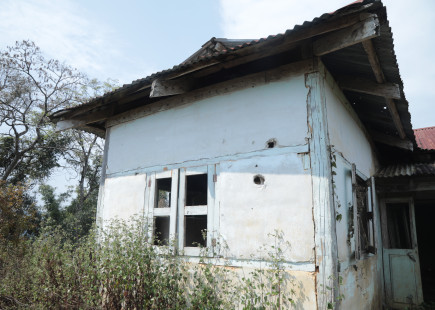
IDP policy on land restitution should be defined as more than just return or resettlement, but the full restoration of our social life and our right to decide and construct our social life in a way of our own choosing in the lands that our forebearers bequeathed to us. At the moment the government does not have any policy on this. Therefore, we demand that before any further step toward camp closure happens, there must be a good policy for operationalizing our right to restitution in its fullest sense. Such a policy cannot be made without the active participation and approval of all IDPs across Myanmar (and not just in Kachin and Northern Shan alone). We want a policy of real restitution, not just camp closure, not just return.
There will never be real peace in Myanmar without real restitution. The government’s Camp Closure Strategy is not real restitution, and, combined with VFV Land Law, is a perversion of restorative justice. The government might try to offer incentives for our return or resettlement – such as promises of roads, electricity, schools etc. But that’s not what we want. We want restitution of social life, not just the space.
This is our call as IDPs. But we know that there are many others, many other working people throughout the country that also need land. So in addition to our IDP call for real restitution, we also call to all those interested to achieve real peace with real justice and real democracy to join in solidarity with us and with all other working people.
Camp Closure without real restitution justifies land grabbing.
VFV Land Law is legalizing land grabbing.
No to Camp Closure without restitution!
No to VFV Land Law!
Solidarity of all the working people in our struggle for peace, justice and democracy!
